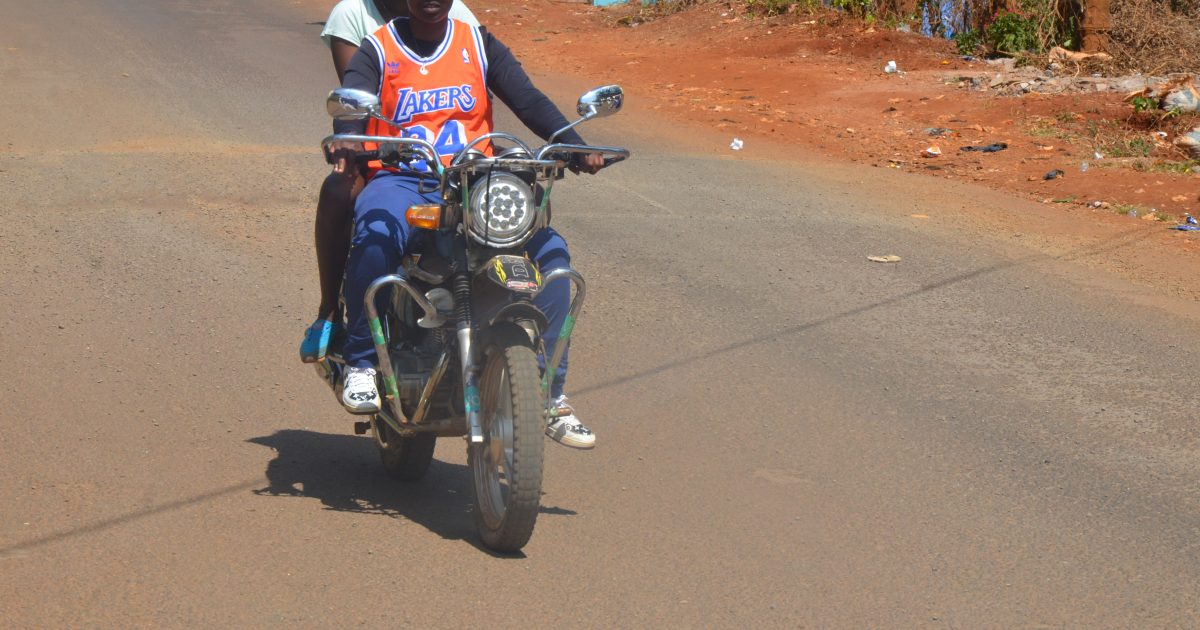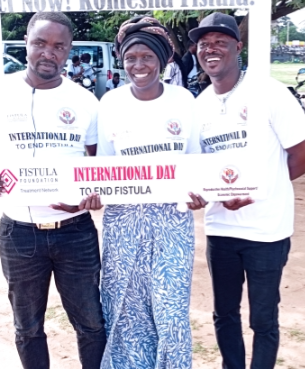Jackline Wawira, a 25-year-old woman, has been living in Nyeri for as long as she can remember. But as a young woman she has beaten all odds to be touted one of the most notable boda boda riders within Nyeri town and its environs.
Born in 1997 and raised in Nyeri County, Wawira who is the only child in her family, attended Kigetuini Primary School before proceeding to Kigongo secondary school for her Secondary school.
After completing her basic education course, she enrolled at the National Youth Service (NYS) but later quit and started working for Airtel Kenya hawking the telco’s products, she had to quit the job owing to poor sales that affected her earnings to a great deal.
Wawira told KNA that she decided to quit her previous jobs due to low income and opted to venture into the bodaboda business. She said her decision to move into the male dominated sector was borne out of her childhood dream of owning her own car one day.
In addition, despite the fact that she is yet to realize the dream, she says the vision still remains. For now, her focus is to work and save as much money as possible and see where the next road leads.
“Starting a business was not easy for me and so I decided to secure a loan in order to have my own motorcycle. I started with the motorbike because that is what I could afford at the time,” Wawira narrates.
The good news is that she has already completed paying off the loan. Since she ventured into her current business, she says her parents are her biggest cheerleaders, always there to pat her back.
She not only manages to provide for her daily basic needs but is also able to chip in whenever her family needs her assistance.
Nevertheless, being a woman in a male dominated field has its fair share of challenges ranging from being frowned upon to outright sexual harassment. At other times her clients appear reluctant to ride on her bike for fear she might not be steady enough.
Another challenge according to her is that some of her customers tend to disappear with her money after proposing to pay via their mobile phones.
“The challenges I encounter in my day-to-day work are many in this occupation and even become profound when you take into consideration that I am a woman working among men. At times I ferry male clients who appear to be genuine customers but once you hit the road, they cling to you in an inappropriate manner,” she says.
“Other times you end up losing your money after someone promises to pay the fare through the mobile phone payment platform but ends up reversing the money. By the time you realize you have been swindled, the client has already turned round the corner and vanished among the crowds of people,” she points out.
Coupled with such challenges include her safety and the security of her motorcycle owing to the fact she often works past 9pm. During such late hours, Wawira is always cautious about her pillion passengers and only ferries people she is either conversant with or women who are rarely a threat.
She, however, hopes to open another business some day and hire riders who will manage her motorcycles once she saves enough from her current occupation. Despite the challenges. the job has enabled her to cater for her upkeep without having to rely on anybody.
To young people still discriminating the kind of occupation they can undertake, Wawira urges them to discard such mentality and do whatever comes their way as they wait for their dream jobs.
“In the near future, I plan to open a bigger business due to the demanding nature of this job. I also plan to buy more motorcycles and even drive my own car. There are lots of jobs out there but I feel many of the young people are too choosy when it comes to looking for employment opportunities,” she adds.
Michael Nderitu, who is a colleague heaps lots of praises on Nyawira and described her as a dedicated and diligent rider. Due to her commitment, Nderitu rarely leaves her out whenever an opportunity arises in which an extra operator is needed.
“Whenever there is a job opportunity out there which she cannot manage, Nyawira often alerts us. I similarly contact her any time I have more than one passenger call her when I get a job that requires more than two people,” says Nderitu.
Sarah Wanjiku, 20 is an automobile repairer working downtown near the Nyeri town matatu terminus. When KNA met her at her garage, Wanjiku was in her customary blue working overalls, black sport shoes and a black cap ready to undertake her routine duties.
She was born in Nyeri in a family of five children. She attended Temple Road primary school before joining Riamukurwe Secondary School where completed her studies in 2019.
Wanjiku however says it was during her childhood days when she developed a liking for the automotive industry, a passion which was to shape her career path in life.
“Immediately after I completed my high school studies in 2019, I embarked on training as a mechanic specializing in electrical wiring. It has however, taken me two years to gain the required skills,” narrates Wanjiku.
Unlike other women who are often shy to take such odd jobs due to societal prejudice, Wanjiku says she was lucky since her family has always stood by her side urging her to follow her heart.
And among those who have cheered her most is her mother. “I no longer depend on my family since I started this job. I have also been able to rent my own house and cater for my personal needs. Above all I am happy since most of the customers appreciate my work despite the fact that I am a woman,” Wanjiku adds.
She narrates that the major challenge one faces in this occupation is that in the process of repairing a customer’s vehicle one may damage it by mistake. “Despite being an expert in this career, we still find ourselves making some mistakes. That’s why it’s critical to keep on learning and unlearning for you to keep improving,” she adds.
Martin Ngari, who is Wanjiku’s coworker, describes her as a hardworking woman who at times works better than some of the male colleagues. He heaps praises on her for her professionalism and high sense of discipline at work, adding that in this career one needs to be confident.
“She is committed to her work and has so far yielded good results. I never get complaints from customers and whenever I am not around, she handles everything well. Everyone can do this job irrespective of gender,” says Simon Ndung’u, her boss.
Wanjiku encourages the youth, especially the young women to venture in the same field or any other field that has been traditionally been male dominated. She is one person who believes in herself and is always prepared for what may come her way.
By Samuel Maina and Alex Macharia





